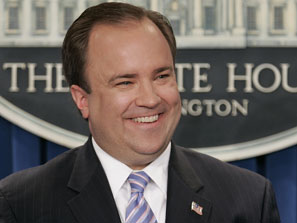
White
House spokesman Scott McClellan was in a good
mood
on his last day in that office, May 5, 2006. His new
memoir
has rocked Washington like nothing has in years.
The Times of India, India
Ex-Spokesman Does
'Hatchet-Job' on Bush
"McClellan was one of several successive
White House spokesmen who turned the daily briefing into a propaganda
farce."
By Chidanand Rajghatta
May 29, 2008
India
- The Times of India - Original Article (English)
WASHINGTON: A hatchet job isn't
something one would expect from a person tasked with fielding questions and
shielding the U.S. president from the media inquisition that takes place
virtually every day on the White House podium.
But that's what former White
House spokesman Scott McClellan appears to have done, in a damning memoir in
which he accuses his long-time boss of fooling the American people with a
sophisticated political propaganda campaign and manipulating the sources of
public opinion as he misled America into war against Iraq.
McClellan's 341-page book, What
Happened: Inside the Bush White House and Washington's Culture of Deception
won't even hit bookstores until Monday. But excerpts have been leaked to boost
sales, and in the process have inflamed political salons already in the throes
of electing the next president of the United States.
In several harsh passages of
the book, including a chapter bluntly entitled Selling the war,
McClellan reportedly eviscerates the administration and boss he served as
principal spokesman for over three years, saying that Bush shaded the truth
about the Iraq War and "managed the crisis in a
way that almost guaranteed that the use of force would become the only feasible
option."
He writes, "Over that
summer of 2002, top Bush aides had outlined a strategy for carefully
orchestrating the coming campaign to aggressively sell the war ... In the
permanent campaign era, it was all about manipulating sources of public opinion
to the president's advantage." McClellan himself was just a messenger, he
suggests.
SCOTT MCCLELLAN ON NBC'S TODAY, MAY 29
"What I do know is that
war should only be waged when necessary, and the Iraq War was not
necessary," adds the man who routinely defended the war from the White
House from 2002-2005, before being eased out in a reshuffle at the start of
Bush's second term.
"The president had
promised himself that he would accomplish what his father had failed to do by
winning a second term in office," he continues. "And that meant
operating continually in campaign mode: never explaining, never apologizing,
and never retreating. Unfortunately, that strategy also had less justifiable
repercussions: never reflecting, never reconsidering, and never compromising.
Especially not where Iraq was concerned."
The 40-year-old McClellan is
from Bush's home state of Texas, joining him as an aide very early in his
campaign for the presidency. He then moved to Washington to serve as deputy to Ari Fleisher.
|

|
|
Indian newsman
Raghubir Goyal, aka 'Goyal the Foil': He could always be counted on to
ask questions totally unrelated to the matter at hand ...
|
|
|
McClellan was one of several
successive White House spokesmen who turned the daily briefing into a
propaganda farce, most notably by credentialing ethnic Indian grocery-store
newsman Raghubir Goyal  as a White House correspondent. That
journalist, so greatly ridiculed in the U.S. media as "Goyal
the Foil" for asking inane questions [usually about India and Pakistan],
was frequently used by White House Spokesmen as a "foil" for
deflecting more serious questioning by legitimate White House press corps.
as a White House correspondent. That
journalist, so greatly ridiculed in the U.S. media as "Goyal
the Foil" for asking inane questions [usually about India and Pakistan],
was frequently used by White House Spokesmen as a "foil" for
deflecting more serious questioning by legitimate White House press corps.
In episodes of contrition in
the book, McClellan doesn't exempt himself from criticism, saying, "I fell
far short of living up to the kind of public servant I wanted to be." But
he also calls the news media "complicit enablers" of the White
House's "carefully orchestrated campaign to shape and manipulate sources
of public approval" in the march to the Iraq War in 2002 and 2003.
The former spokesman also
takes swipes at several White House principals, including Vice President Dick
Cheney and Secretary of State Condoleezza Rice. He calls Cheney "the magic
man" who steered policy behind the scenes while leaving no fingerprints,
and Rice as someone who was adept at protecting her reputation.
"No matter what went
wrong, she was somehow able to keep her hands clean," he writes of Rice,
adding that "she knew how to adapt to potential trouble, dismiss brooding
problems, and come out looking like a star."
SEE ALSO:
The Times of India, India
Ex-Spokesman Does
'Hatchet-Job' on Bush
http://worldmeets.us/timesofindia000011.shtml
Khaleej Times,
United Arab Emirates
McClellan Will
'Come Out the Stronger'
http://worldmeets.us/khaleejtimes000039.shtml
Guardian Unlimited, U.K.
McClellan's
'Other Villain'
http://commentisfree.guardian.co.uk/michael_tomasky/2008/05/mcclellans_other_villain.html
The Independent, U.K.
The
McClellan Fallout: The
Devious
World of George Bush
http://www.independent.co.uk/news/world/americas/falling-out-with-the-president-the-devious-world-of-george-bush-835868.html